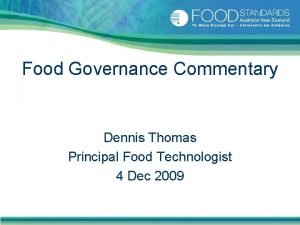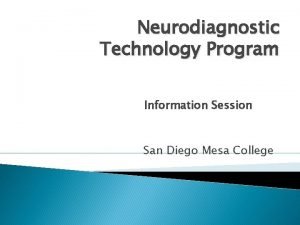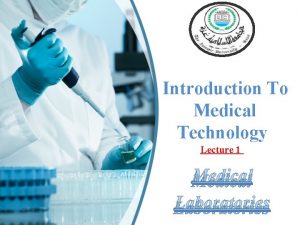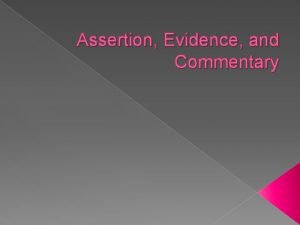Food Governance Commentary Dennis Thomas Principal Food Technologist









- Slides: 9

Food Governance Commentary Dennis Thomas Principal Food Technologist 4 Dec 2009

Key topics to cover • Key trends internationally in food governance • Key challenges or successes in food governance in NZ and Australia right now • What do we need to take into account when we are developing /investing in future food technologies?

Key trends internationally in food governance Typical Governance Objectives: • the protection of public health and safety; and • the provision of adequate information relating to food to enable consumers to make informed choices; and • the prevention of misleading or deceptive conduct. (section 18 of the FSANZ Act)

Key trends internationally in food governance Government: • Increasing separation and independence, of compliance and enforcement, risk management, risk analysis, and policy • Transparency / accountability • Minimum effective regulation • Multi-agency responsibility for various elements of food governance, e. g. environment, chemicals, microbes, GM, food additives, food processing. Multi-Government: • e. g. Codex, work-arounds through bilaterals and multilaterals Private Standards in Addition to Government Requirements: • Ecological and social brands and associated requirements • Private standards, e. g. BRC

Key challenges or successes in food governance in NZ and Australia right now Key challenges: • Food-Medicine interface • When should the regulator intervene? e. g. enabling innovation and competitiveness internationally whilst maintaining safety • Efficiency/speed • Variance of views between stakeholders and within stakeholder groups – e. g. health claims • Balance between prescribed and voluntary labelling

Key challenges or successes in food governance in NZ and Australia right now Key successes: • Good international record for food safety • Good partnerships e. g. for incident management • Use of scientific reviews, e. g. dietary modelling, GM • Primary production standards (Australia; except raw milk) • Target a common approach at international meetings • Whole-of government initiatives for nanotechnology • Ministerial Council • FSANZ still here!

Key challenges or successes in food governance in NZ and Australia right now Implications for governance from trends in social values/consumer preferences globally and in NZ • Demands for labelling and product controls beyond existing norms • Pressure to re-weight FSANZ Act objectives • Increasing divergence between food-as-fuel and food-as-extension of social values

What needs to be taken into account when developing /investing in future food technologies? • • Many regulatory bodies conduct their own assessments – there is no global approval. This means acquiring required data sets efficiently. A food (automatically) permitted in one country may be regarded as needing pre-market approval in another country. Even if the food safety conclusion is the same, different countries may have very different labelling permissions and/or prohibitions. Some major jurisdictions have quite tight definitions of novel foods – including novel processes. Australia/NZ lies approximately in the middle of the range. Identify if pre-processing is caught up in regulatory requirements. Because of social / governance decisions some products may not be allowed even if the science community generally regards them as safe – e. g. GM, cloned animals, non-halal. The food safety regulator may be the least of your worries!

Copyright © Food standards Australia New Zealand 2009 This work is copyright. You may download, display, print and reproduce this material in unaltered form only (retaining this notice) for your personal, non commercial use or use within your organisation. Apart from any other use as permitted under the Copyright Act 1968, all other rights are reserved. Requests for further authorisation should be directed to information@foodstandards. gov. au.
 Dennis food technologist
Dennis food technologist Neurodiagnostic technologist certificate program
Neurodiagnostic technologist certificate program Venipuncture radiologic technologist
Venipuncture radiologic technologist Role of medical technologist
Role of medical technologist Oacett certification
Oacett certification Chief technologist
Chief technologist Certified broadcast networking technologist
Certified broadcast networking technologist Forensic pathologist vs forensic anthropologist
Forensic pathologist vs forensic anthropologist Specs and slims template
Specs and slims template Aec paragraph
Aec paragraph

















